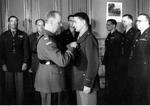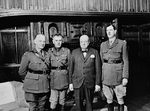Władysław Sikorski
| Surname | Sikorski |
| Given Name | Władysław |
| Born | 20 May 1881 |
| Died | 4 Jul 1943 |
| Country | Poland |
| Category | Military-Ground |
| Gender | Male |
Contributor: John Radzilowski
ww2dbaseBorn in 1881 in the Austrian-controlled region of Poland, Władysław Sikorski received his early military training in the Austro-Hungarian officer corps. In 1914, he became active in the Polish National Committee in Kraków which originally sought to reunite Poland under the aegis of the Austrian empire. Sikorski became head of the committee’s military section and was directly involved with the formation of Józef Piłsudski’s Polish Legion. His energy and intelligence soon marked him as a rising star among Austria’s Polish officers. After Poland declared independence in 1918, he led Polish troops against Ukrainian forces. During the Polish-Soviet War of 1920, he commanded the Polish Fifth Army. During the Polish Army’s successful counterattack in August and September of that year, Sikorski led a successful mechanized attack on Soviet forces at Kowel. Sikorski’s experiences in 1920 would lead him to write a book in 1926 in French on the future use of mechanized forces. During the 1920 war, Sikorski also met a young officer attached to the otherwise fruitless French military mission to Poland who shared his thoughts on mechanized warfare. This officer was named Charles de Gaulle and like Sikorski would write an early treatise on mechanized warfare. Both men’s books were ignored in the west, but read eagerly in Germany where they would help spark a revolution in modern warfare.
ww2dbaseFollowing the war, Sikorski served in a variety of governmental positions, including as prime minister. Following Piłsudski’s coup de etat in 1926, however, Sikorski fell from favor and spent much of the 1930s in France and Switzerland. After Poland’s defeat in 1939, Sikorski was chosen as prime minister of the new Polish government—a government in exile—as well as commander in chief of all armed forces (both those in exile and underground resistance forces in the homeland). Because he was outside of Poland in 1939 and not part of clique of ex- Piłsudskities that ran Poland after 1935, he was not held responsible by his fellow Poles for the Polish defeat. He was the one political and military figure who could hold together the various political factions that emerged in the exile government as well as provide effective leadership for the Polish armed forces.
ww2dbaseSikorski successfully reorganized the Polish armed forces in exile, emphasizing mechanized warfare and air power. He was able to keep the exile government together in the face of mounting concerns over Soviet intensions toward Poland and the possibility that the Allies might redraw Polish borders to appease Stalin. He also helped indirectly to provide guidance to the underground Polish Home Army that was preparing for an all-out uprising against the German occupiers later in the war. Because of this, Sikorski became a symbol of hope and renewal for Poles. His diplomatic skills gained him the respect of his British and American counterparts who found him easier to deal with than his prickly colleague De Gaulle.
ww2dbaseOn 4 Jul 1943, following an inspection tour of Polish forces in the Middle East, Sikorski’s plane crashed shortly after takeoff from Gibraltar, killing Sikorski and his daughter (who served as his personal assistant). The circumstances of the crash remain mysterious and the subject of much speculation as to possible Soviet involvement. Nevertheless, no assassination theory has ever been proven. He was the only Allied commander in chief to die in a combat zone.
ww2dbaseSikorski’s death had a disastrous effect on the Polish government in exile. Old divisions quickly emerged and severely limited its ability to respond effectively to Soviet machinations. Nevertheless, the Polish armed forces in exile whose growth he had overseen and directed proved extremely effective and valuable to the Allied cause. In all Poland would field the fourth largest force in the anti-Nazi coalition, larger even than that of France.
ww2dbaseSources: Norman Davies, God's Playground: A History of Poland (1981); Prominent Poles (Polish biography website of Dr Roman Solecki): http://www.angelfire.com/scifi2/rsolecki/wladyslaw_sikorski.html.
Last Major Revision: Dec 2005
Photographs
 |  |  |  |
Władysław Sikorski Timeline
| 20 May 1881 | Wladyslaw Sikorski was born. |
| 16 Jul 1941 | General Wladyslaw Sikorski was presented with the Standard of the Polish Air Force at RAF Swinderby in England, United Kingdom. Smuggled out of Poland, via Stockholm in Sweden, the Standard would subsequently be held by each Polish Squadron in the United Kingdom during the war years. |
| 4 Jul 1943 | General Sikorski and other members of Polish government-in-exile were killed in a plane crash in Gibraltar. Sabotage was suspected but it was never proven. |
Please consider supporting us on Patreon. Even $1 per month will go a long way! Thank you. Please help us spread the word: Stay updated with WW2DB: |
Visitor Submitted Comments
10 Dec 2011 11:32:59 AM
It was definitely the Soviet authorities. A precise date on which the salvage operation took place cannot be determined but it was roughly six weeks after the crash. To this day the Russian government (and British government) refuse to release information from their top secret files. Incidentally, the Russian government has used the same MO after the crash of President Kaczynski's aircraft on April 10, 2010.
16 Sep 2012 09:32:57 PM
I am the son of a ex Polish Plutony K.O.P. who escaped KATYN by changing his details and placed in 3 Stalags in Germany. He escaped whilst on a 3rd Reich farm and eventually revealed who he was became one of General Sikorskis special men to protect him. I am about to write a book on behalf of my father he told me exactly what happened as a Soldier admitted what was done and sadly it was sabotage and the way it was done was so simple. Done in minutes under the cover of darkness and by his own countrymen externally to the plane.
The pressure was on by Anders and Churchill wanted him out of the way for fear of Stalin was seething about the challenge of KATYN.
This was attempt no 3 and it worked.
10 Jul 2013 10:32:26 AM
Few days before his dead at Syrian-Turkish border Gen. Sikorski met an Hitler's messenger what made Churchill to have a coleric rage and this is not a conspiracy theory. Still in Gibraltar his daughter Zofia Lesniowska was "invited" to board the B24 transporting the soviet embassador Maisky outbound to Moscow instead her father's plane that was parked just aside. For some 30 minutes both B24s run the engines at full power with parking brakes on while few people entered the Sikorski plane. In 2008 the polish government ordered an autopsy of Gen. Sikorski remains that show some 60 broken bones (some could cause dead) and are not coherent with description of the "accident", at the end of runway pilot (the only who survived) reduced engines and did a perfect and very soft water landing, escaped from the roof door, walked over the left wing, dive into water and swam to the margin where a car was awaiting him. Altough Sikorski had official funeral as an important stateman in the following days the remaining polish government in London were arrested and the US and Britsh allies recognised as the sole representant of the polish nation a pro-communist comitee established in Moscow. The official report of the "accident" was classified "top secret" for 50 years, should be released in 1993 but due to situation at Poland at that time "top secret" classification was postponed for another 50 years.
10 Jul 2013 12:14:43 PM
This is truly ridiculous. Sikorski did not meet with a Nazi representative, his daughter was not aboard a plane with the Soviet ambassador, the Czech pilot was injured and did not swim to a waiting car. Moreover the Polish government in London was NOT arrested. It continued to operated in London until after the fall of communism.
All visitor submitted comments are opinions of those making the submissions and do not reflect views of WW2DB.
» Message from Biddle to Hull
- » 1,167 biographies
- » 337 events
- » 44,601 timeline entries
- » 1,243 ships
- » 350 aircraft models
- » 207 vehicle models
- » 376 weapon models
- » 123 historical documents
- » 261 facilities
- » 470 book reviews
- » 28,520 photos
- » 367 maps
Thomas Dodd, late 1945
Please consider supporting us on Patreon. Even $1 a month will go a long way. Thank you!
Or, please support us by purchasing some WW2DB merchandise at TeeSpring, Thank you!
6 Feb 2011 04:38:22 AM
would still like to know date when liberator air craft was raised from the sea and by whom